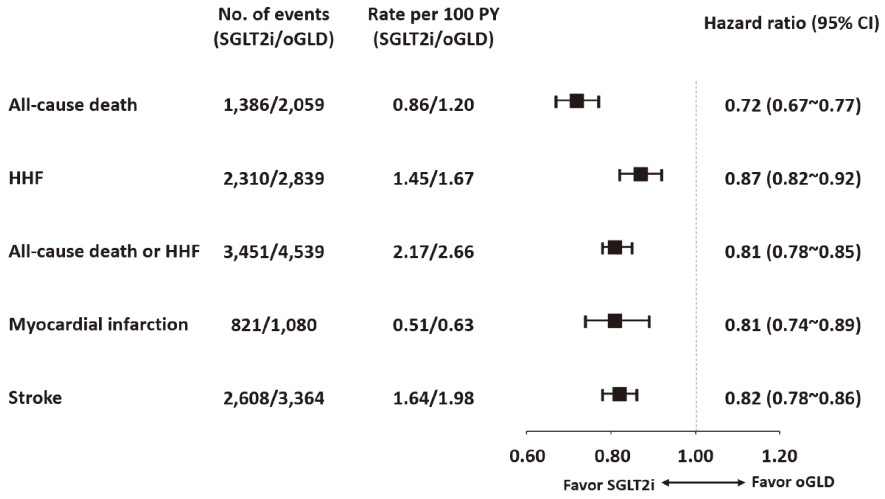J Korean Diabetes.
2018 Sep;19(3):135-139. 10.4093/jkd.2018.19.3.135.
Preventive Effect of an SGLT2 Inhibitor on Cardiovascular Disease in an Observational Study: Results from a Korean Population
- Affiliations
-
- 1Department of Endocrinology and Metabolism, Ajou University School of Medicine, Suwon, Korea. djkim@ajou.ac.kr
- 2Cardiovascular and Metabolic Disease Etiology Research Center, Ajou University School of Medicine, Suwon, Korea.
- 3Institute on Aging, Ajou University Medical Center, Suwon, Korea.
- KMID: 2421293
- DOI: http://doi.org/10.4093/jkd.2018.19.3.135
Abstract
- The sodium-glucose cotransporter-2 inhibitor (SGLT2i) is a new anti-hyperglycemic agent that have function to concomitantly inhibit the reabsorption of glucose and sodium in the renal proximal convoluting tubule. Recent two cardiovascular outcome trials showed that a lower risk of cardiovascular events with SGLT2i in people with type 2 diabetes. In addition, prior real-world data demonstrated similar SGLT2i effects, but these studies were limited to the United States and Europe. Thus, the CVD-REAL (Comparative Effectiveness of Cardiovascular Outcomes in New Users of Sodium-Glucose Cotransporter-2 Inhibitors) 2 Study was investigated cardiovascular outcomes in those initiated on SGLT2i versus other glucose-lowering drugs (oGLDs) across 6 countries in the Asia Pacific, the Middle East, and North American regions. In Korea, 336,644 episodes of initiation in SGLT2i or oGLD group between September 2014 and December 2016 were identified in Korea National Health Insurance database after propensity score matching. SGLT2i users was associated with a lower risk of all-cause death (hazard ratio [HR], 0.72; 95% confidence interval [CI], 0.67~0.77), hospitalization for heart failure (HHF) (HR, 0.87; 95% CI, 0.82~0.92), all-cause death or HHF (HR, 0.81; 95% CI, 0.78~0.85), myocardial infarction (HR, 0.81; 95% CI, 0.74~0.89), and stroke (HR, 0.82; 95% CI, 0.78~0.86) compared with oGLD users. In conclusion, initiation of SGLT2i had a lower risk of cardiovascular events in people with type 2 diabetes compared with oGLDs.
Keyword
MeSH Terms
Figure
Reference
-
1. Lee DH. The non-glycemic effects of SGLT2 inhibitor. J Korean Diabetes. 2014; 15:151–157.
Article2. Zinman B, Wanner C, Lachin JM, Fitchett D, Bluhmki E, Hantel S, Mattheus M, Devins T, Johansen OE, Woerle HJ, Broedl UC, Inzucchi SE. EMPA-REG OUTCOME Investigators. Empagliflozin, cardiovascular outcomes, and mortality in type 2 diabetes. N Engl J Med. 2015; 373:2117–2128.
Article3. Mahaffey KW, Neal B, Perkovic V, de Zeeuw D, Fulcher G, Erondu N, Shaw W, Fabbrini E, Sun T, Li Q, Desai M, Matthews DR. CANVAS Program Collaborative Group. Canagliflozin for primary and secondary prevention of cardiovascular events: results from the CANVAS Program (Canagliflozin Cardiovascular Assessment Study). Circulation. 2018; 137:323–334.
Article4. Kosiborod M, Cavender MA, Fu AZ, Wilding JP, Khunti K, Holl RW, Norhammar A, Birkeland KI, Jørgensen ME, Thuresson M, Arya N, Bodegård J, Hammar N, Fenici P. CVD-REAL Investigators and Study Group. Lower risk of heart failure and death in patients initiated on sodium-glucose cotransporter-2 inhibitors versus other glucose-lowering drugs: the CVD-REAL study (comparative effectiveness of cardiovascular outcomes in new users of sodium-glucose cotransporter-2 inhibitors). Circulation. 2017; 136:249–259.
Article5. Suissa S. Lower risk of death with SGLT2 inhibitors in observational studies: real or bias? Diabetes Care. 2018; 41:6–10.
Article6. Yoon KH, Lee JH, Kim JW, Cho JH, Choi YH, Ko SH, Zimmet P, Son HY. Epidemic obesity and type 2 diabetes in Asia. Lancet. 2006; 368:1681–1688.
Article7. Kosiborod M, Lam CSP, Kohsaka S, Kim DJ, Karasik A, Shaw J, Tangri N, Goh SY, Thuresson M, Chen H, Surmont F, Hammar N, Fenici P. CVD-REAL Investigators and Study Group. Cardiovascular events associated with SGLT-2 inhibitors versus other glucose-lowering drugs: the CVD-REAL 2 study. J Am Coll Cardiol. 2018; 71:2628–2639.
Article8. Williams RL. A note on robust variance estimation for cluster-correlated data. Biometrics. 2000; 56:645–646.
Article9. Kim YG, Han SJ, Kim DJ, Lee KW, Kim HJ. Association between sodium glucose co-transporter 2 inhibitors and a reduced risk of heart failure in patients with type 2 diabetes mellitus: a real-world nationwide population-based cohort study. Cardiovasc Diabetol. 2018; 17:91.
Article10. American Diabetes Association. 8. Pharmacologic approaches to glycemic treatment: standards of medical care in diabetes-2018. Diabetes Care. 2018; 41:Suppl 1. S73–S85.11. Wiviott SD, Raz I, Bonaca MP, Mosenzon O, Kato ET, Cahn A, Silverman MG, Bansilal S, Bhatt DL, Leiter LA, McGuire DK, Wilding JP, Gause-Nilsson IA, Langkilde AM, Johansson PA, Sabatine MS. The design and rationale for the Dapagliflozin Effect on Cardiovascular Events (DECLARE)-TIMI 58 Trial. Am Heart J. 2018; 200:83–89.
Article
- Full Text Links
- Actions
-
Cited
- CITED
-
- Close
- Share
- Similar articles
-
- Safety Issues with Sodium-Glucose Cotransporter 2 Inhibitors: Clinical Considerations
- SGLT2 Inhibitors in the Cardiovascular Disease
- Effect of Sodium-Glucose Cotransporter-2 Inhibitors versus Dipeptidyl Peptidase 4 Inhibitors on Cardiovascular Function in Patients with Type 2 Diabetes Mellitus and Coronary Artery Disease
- The Potential Cardioprotective Mechanism of Sodium-Glucose Cotransporter 2 Inhibitors
- The Non-glycemic Effects of SGLT2 Inhibitor


